


Explore the best Agile tools for teams in 2025, designed to enhance collaboration, streamline workflows, and improve project management.
Looking for the best Agile tools to streamline your team's workflows in 2025? Here’s a quick guide to help you choose the right one.
Agile tools are essential for managing projects, improving collaboration, and delivering results faster. Whether you're a small team or a large enterprise, the right tool can make a big difference. Here's a quick rundown of the top 9 Agile tools for 2025 and what they offer:
- Jira: Advanced reporting, customizable workflows, and scalability for complex projects.
- Asana: Simple and user-friendly, great for collaboration and task management.
- Trello: Visual Kanban boards for easy task organization.
- ClickUp: Highly customizable with time tracking and automation.
- Microsoft Azure Boards: Enterprise-ready with seamless DevOps integration.
- Pivotal Tracker: Focused on software development with real-time updates.
- Kanbanize: Workflow visualization and bottleneck detection.
- GitLab: Combines Agile project management with DevOps tools.
- daily.dev: Enhances team collaboration with AI-powered solutions.
Quick Comparison:
| Tool | Best For | Pricing (Starting) | Key Features |
|---|---|---|---|
| Jira | Complex projects | Free | Custom workflows, advanced reporting |
| Asana | Simplicity and collaboration | Free | Task prioritization, app integrations |
| Trello | Visual task management | Free | Kanban boards, Power-Ups |
| ClickUp | Customizable workflows | Free | Time tracking, automation |
| Azure Boards | Enterprise DevOps teams | Free | Sprint planning, Power BI integration |
| Pivotal Tracker | Small software teams | Free | Real-time updates, sprint organization |
| Kanbanize | Workflow optimization | $9.95/user/month | Analytics, bottleneck detection |
| GitLab | Agile + DevOps integration | Free | CI/CD pipelines, issue tracking |
| daily.dev | Collaboration and knowledge sharing | Free | AI-powered answers, team spaces |
Each tool has its strengths depending on your team's size, budget, and goals. Dive deeper into the article to find the best fit for your needs.
Top 7 Agile Tools for Project Management in 2025
1. Jira
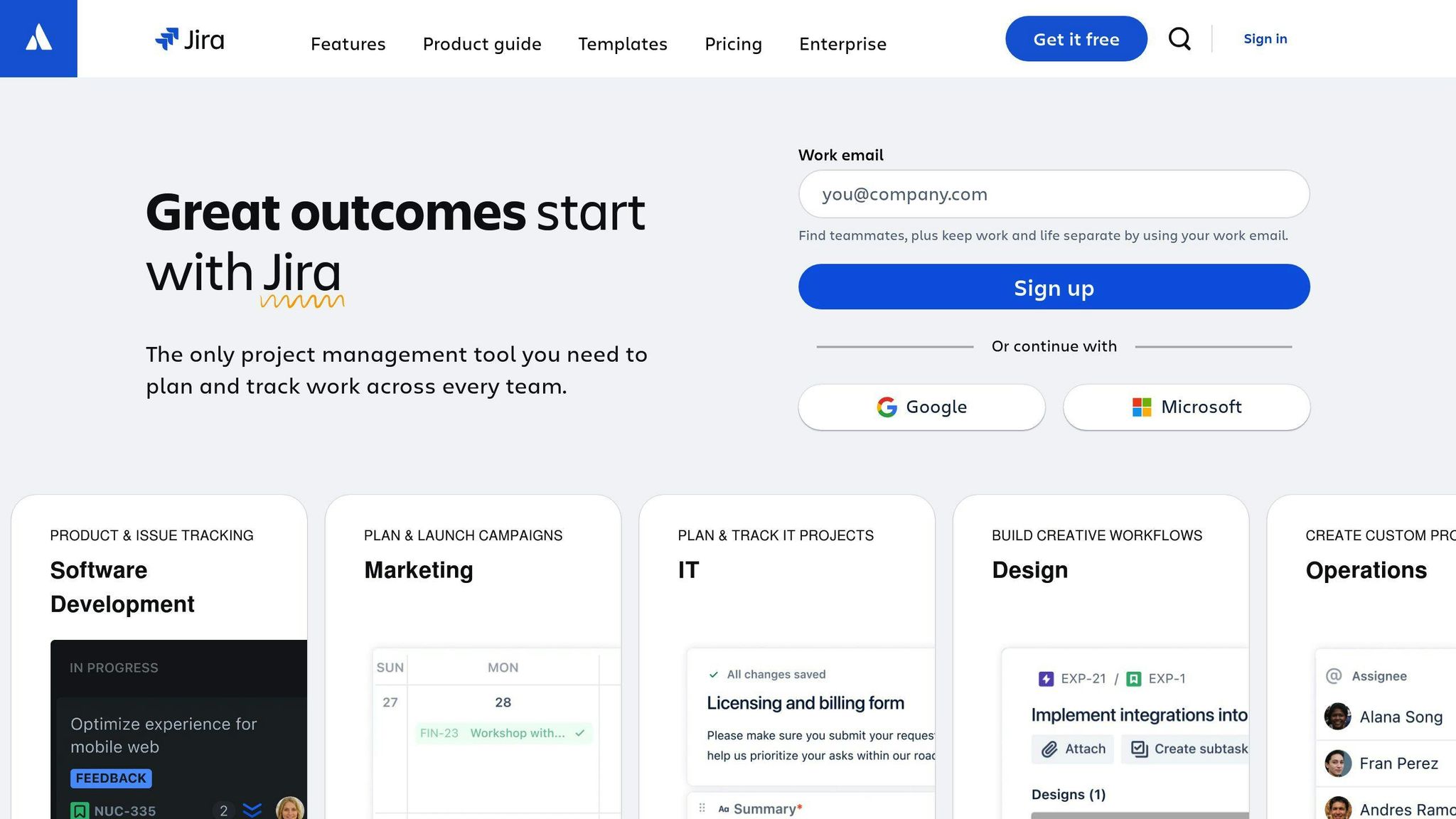
Jira continues to be a top choice for Agile teams in 2025, offering a comprehensive platform to help software development teams plan, track, and manage projects effectively. Built by Atlassian, it’s designed to support teams tackling even the most intricate projects while staying flexible.
Key Features:
- Customizable Scrum and Kanban workflows
- Over 15 real-time reporting insights
- Backlog management made simple
- Integration with more than 3,000 apps
- Built-in task automation tools
- Sprint planning and tracking
- Collaboration tools for documentation
- Detailed project analytics
Jira's ability to bring everything together has proven beneficial for many organizations. For example, Reddit shared their experience:
Cross-functional teams have found it easier to work with developers and technical teams in Atlassian because they don't have to switch tools to create or manage tickets.
This seamless integration helped Reddit save over $300,000 annually after adopting Atlassian tools.
| Plan | Monthly Price per User | Support Level |
|---|---|---|
| Free | $0 | Community forum access |
| Standard | $7 | Business hours support |
| Premium | $14 | 24/7 support |
| Enterprise | Custom pricing | Dedicated support manager |
Canva also highlighted Jira's role in improving teamwork and transparency:
Work becomes a lot more visible when it's all in one place. It makes collaboration a whole lot easier.
Although Jira might feel overwhelming at first, its pre-configured Agile templates for Scrum and Kanban workflows make setup straightforward. Whether you’re a startup or a large enterprise, Jira’s scalability ensures it can meet your needs, with advanced security and compliance features to match.
For teams seeking alternatives, Asana is another strong contender, especially for those who value simplicity and user-friendly collaboration tools.
2. Asana
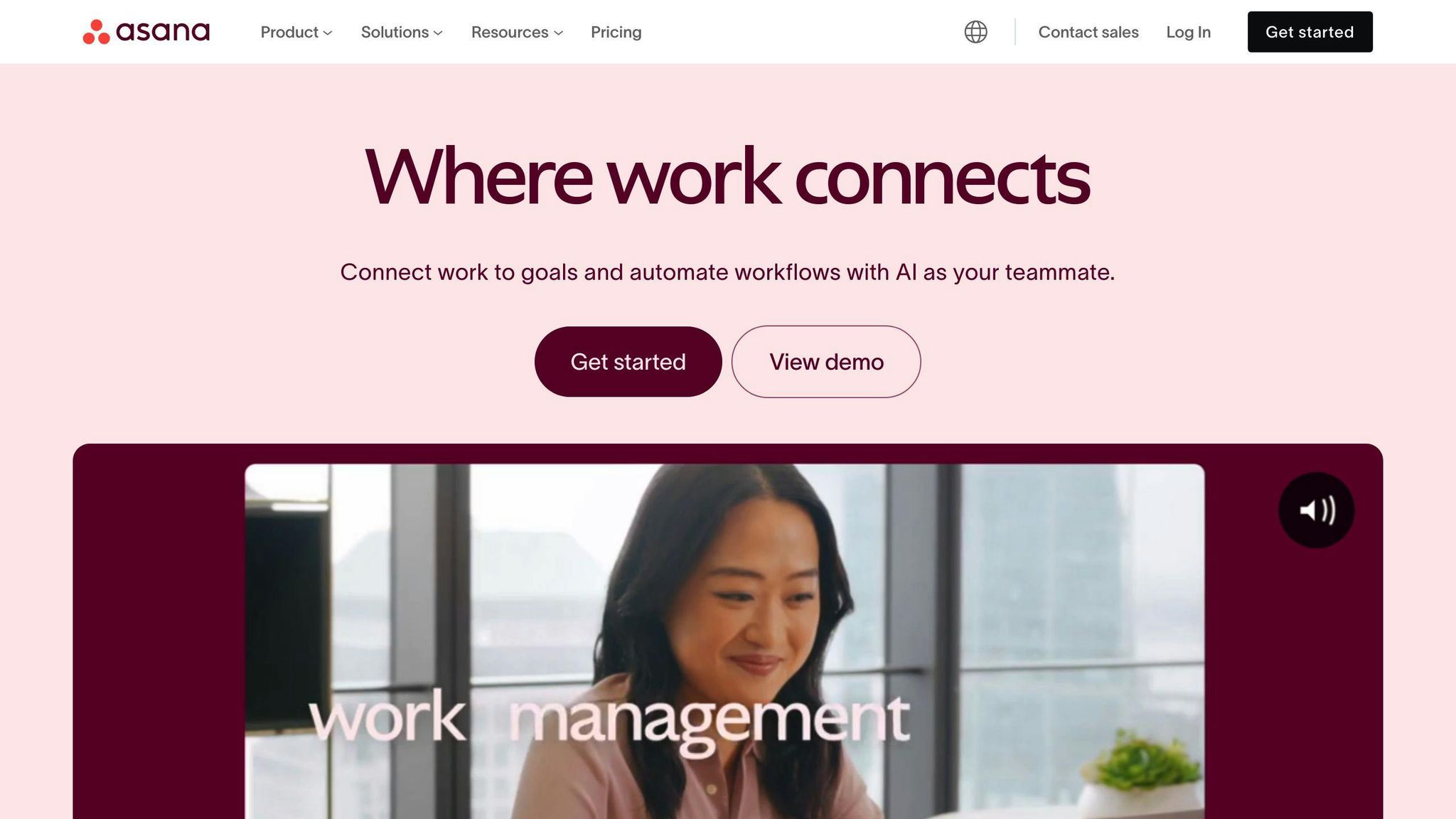
Asana is a project management tool that combines ease of use with a range of powerful features, making it a great choice for teams exploring Agile methods or looking for straightforward task management.
Key Features:
- Supports Agile workflows like Scrum and Kanban
- Tools for sprint planning and backlog organization
- Options to prioritize tasks and view timelines
- Integrates with a wide range of apps
- Collaboration features, including file sharing
- Tracks progress in real time
Asana is built to encourage teamwork and steady progress by simplifying task management. While it shines in tracking tasks and fostering collaboration, its analytics may fall short for larger teams needing deep Agile metrics.
| Plan | Price per User/Month | Best For |
|---|---|---|
| Basic | Free (up to 10 users) | Small teams just starting out |
| Premium | $10 | Teams that need more advanced tools |
| Business | $25 | Organizations needing greater control |
| Enterprise | Custom pricing | Large-scale, tailored implementations |
Asana works seamlessly with tools like GitHub, Slack, and Microsoft Teams, ensuring teams can maintain their workflows without interruption. Its flexibility and collaboration tools make it a strong option for cross-functional teams managing Agile projects.
For those who prefer a more visually oriented tool, Trello is another option worth considering.
3. Trello
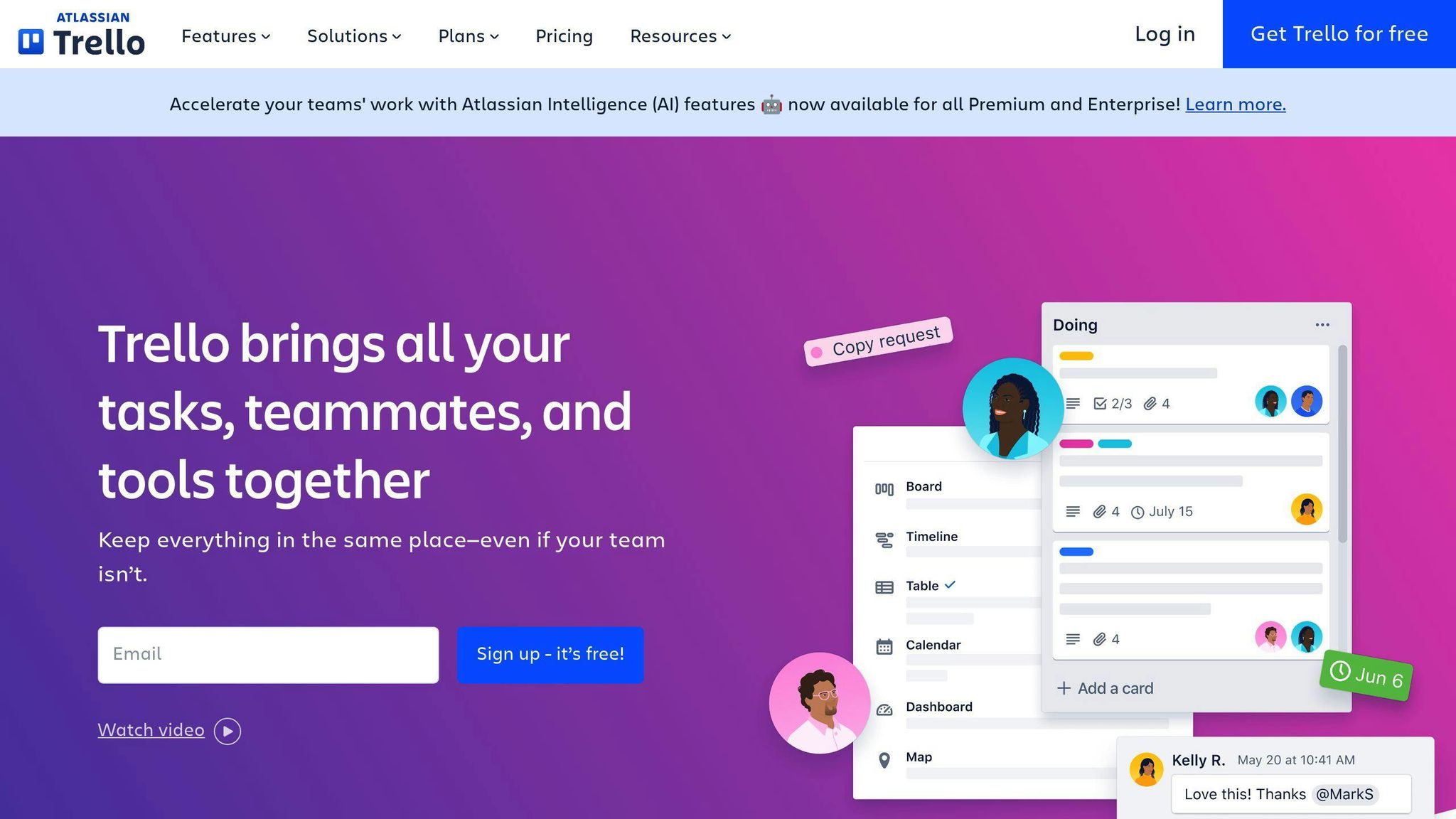
Trello uses a Kanban-style interface that’s simple to navigate and works well for Agile workflows. Its visual, board-based system helps teams organize and manage projects with ease.
Key Features:
- Visual Kanban boards with drag-and-drop tools
- Customizable cards for tasks, complete with checklists, due dates, and attachments
- Butler automation to handle repetitive tasks
- Add-on Power-Ups for extra functionality
- Multiple views, including calendar, timeline, and dashboard
Teams can set up boards to reflect project stages like Backlog, Sprint, and Done. Trello consistently earns high user ratings, with an overall score of 4.5 out of 5. Its ease of use is especially appreciated, scoring 4.4 out of 5.
| Plan | Price (per user/month) | Features |
|---|---|---|
| Free | $0 | Unlimited cards, 10 boards per workspace |
| Standard | $5 | Unlimited boards, advanced checklists |
| Premium | $10 | Advanced project views, unlimited automations |
| Enterprise | $17.50 | Advanced security, organization-wide controls |
"Trello is a popular choice for Agile teams, streamlining workflows and fostering collaboration." - Frugal Testing
Although Trello doesn’t offer some of the advanced Agile-specific features of tools like Jira, its Power-Ups can be tailored to meet many Agile needs. It’s a great fit for small to medium-sized teams, though larger organizations might lean toward tools like ClickUp for more robust capabilities.
4. ClickUp
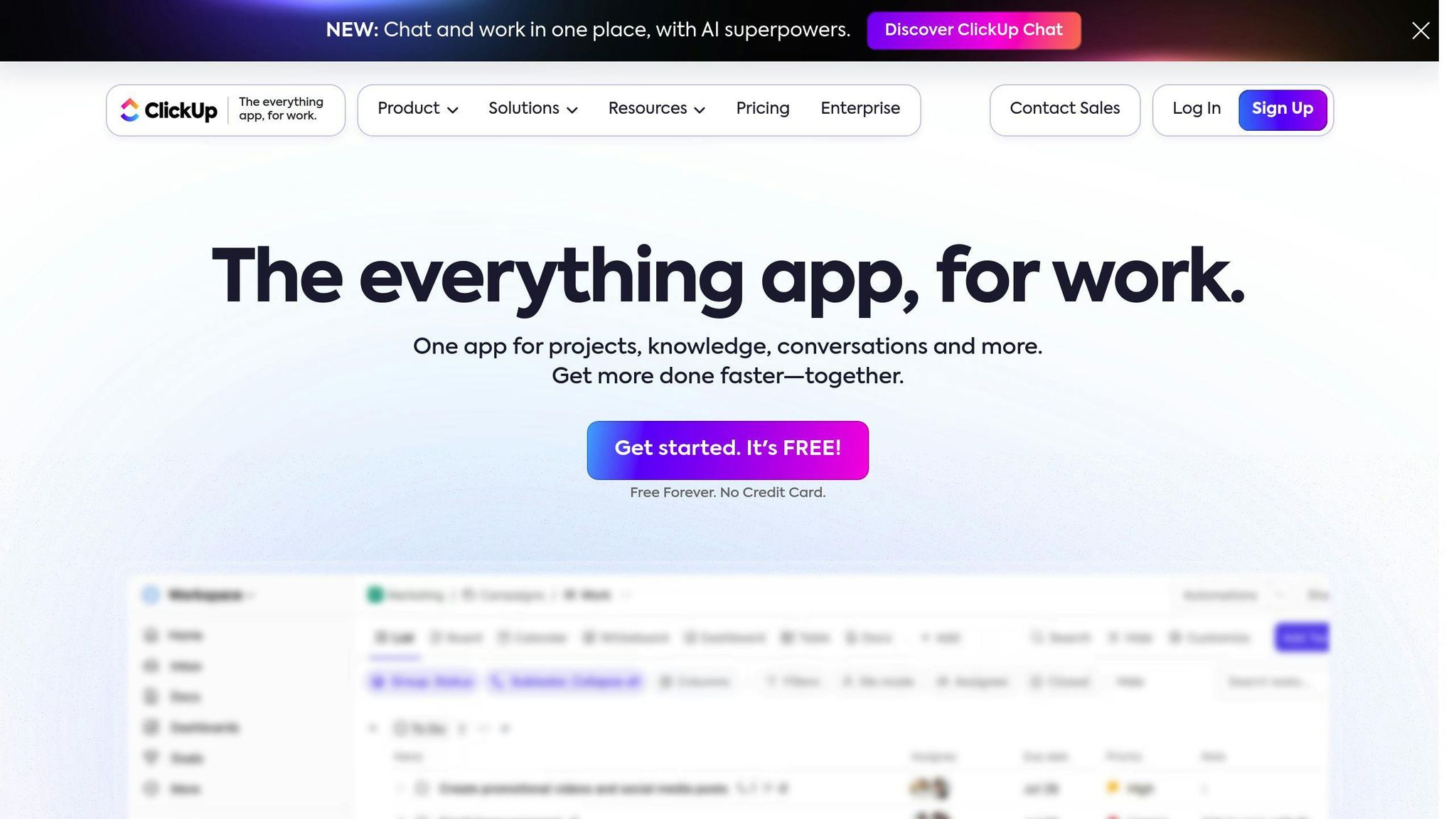
ClickUp is an Agile tool designed to fit a variety of workflows, offering features such as custom views, time tracking, and automation. While its range of features makes it a strong choice for teams looking for tailored solutions, it does come with a learning curve compared to simpler tools like Trello.
Key Features:
- Custom views to support Agile methods like Scrum and Kanban
- Built-in tools for time tracking and goal setting
- Integrated docs and whiteboards for collaboration
- Extensive integrations with popular apps and tools
- Advanced automation to streamline processes
| Plan | Features | Best For |
|---|---|---|
| Free | Basic task management, Docs | Small teams, Basic projects |
| Unlimited | Custom fields, Integrations | Growing teams |
| Business | Advanced automation, Time tracking | Mid-sized organizations |
| Enterprise | White labeling, Advanced security | Large enterprises |
ClickUp stands out with its ability to connect seamlessly with developer tools, helping teams improve productivity and streamline workflows. Its flexibility allows users to tailor their experience to fit specific needs, making it compatible with Agile methodologies like Scrum or Kanban.
"ClickUp's extensive customization options set it apart from traditional Agile tools, though some users find the wide range of features overwhelming at first."
For teams transitioning from other platforms, ClickUp’s versatile views can replicate familiar layouts, such as Kanban boards. Even the free plan includes key features like task management and collaborative tools, offering unlimited tasks and documentation options.
However, setting up ClickUp to meet your team’s needs may require some upfront time and effort, especially to configure workflows that boost productivity.
If you're looking for an Agile tool with a stronger focus on enterprise-level needs, Microsoft Azure Boards might be a good alternative.
5. Microsoft Azure Boards
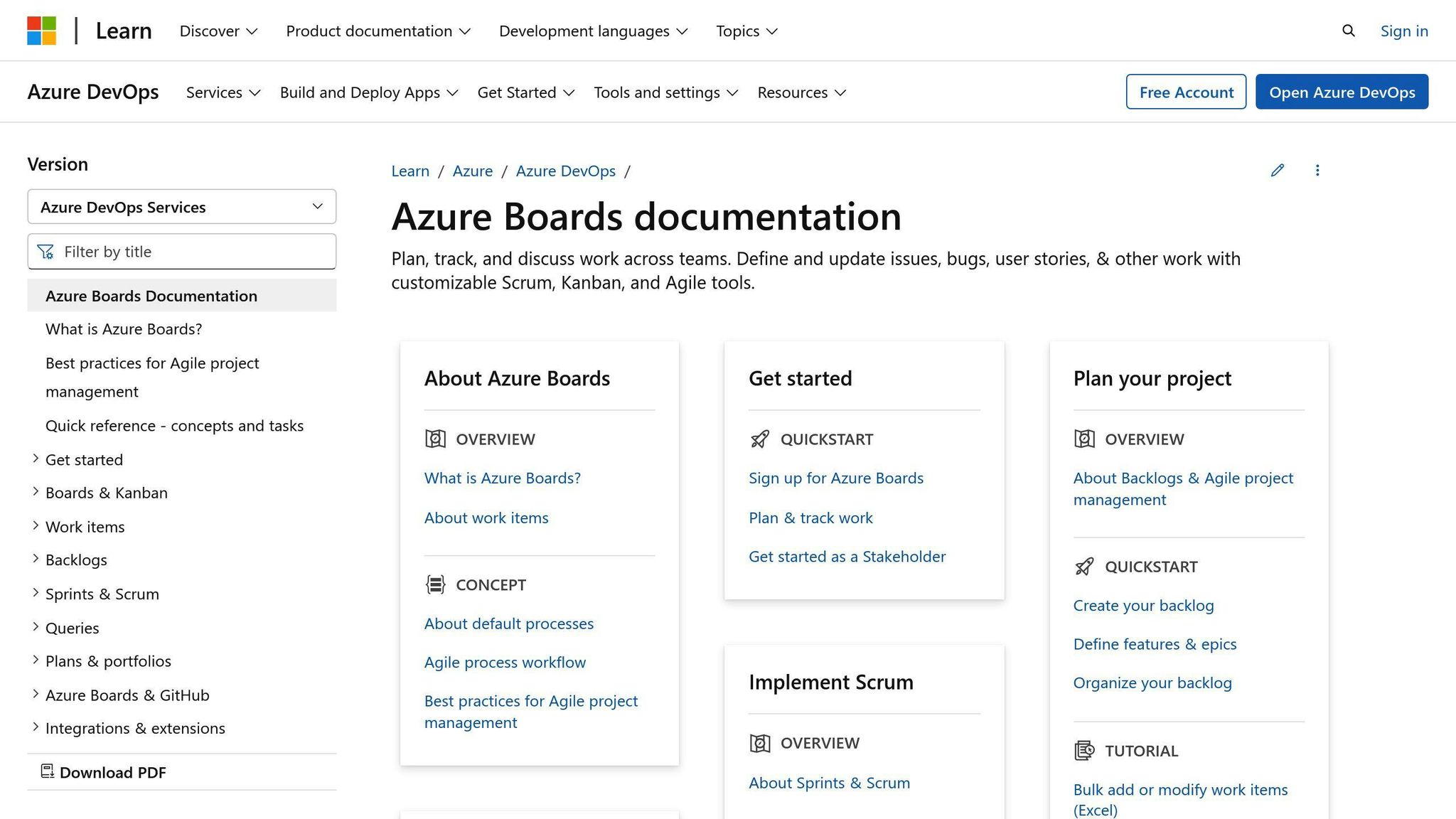
For enterprise teams handling intricate Agile workflows, Azure Boards offers a robust solution as part of the Azure DevOps suite. It’s built to meet the needs of large development teams, combining project planning and tracking with seamless DevOps integration.
Key Features:
| Feature | Description |
|---|---|
| Work Item & Board Management | Track epics, features, and user stories using customizable Kanban and Scrum boards |
| Sprint Planning | Manage sprints with built-in tools, including capacity planning |
| Integration | Connects directly with Azure DevOps and supports reporting through Power BI |
Azure Boards is designed for enterprise environments, offering Power BI reporting and support for Agile, Scrum, and CMMI processes. Pricing starts at $6 per user per month, with a free option available for smaller teams.
"We've used Teams heavily from day one, taking advantage of how it integrates with things like Azure Boards and Azure DevOps work items for sprint planning." - Will Brown, Principal Product Lead for Front-end and Data Discovery, STOPWATCH.
The platform is highly customizable, letting teams adapt workflows as needed. It also supports over 1,000 extensions for added functionality. However, it comes with a steeper learning curve, especially for teams unfamiliar with Microsoft’s development ecosystem.
For enterprise-level needs, Azure Boards is a standout choice. But for teams looking for a simpler Agile tool, Pivotal Tracker might be a better fit.
sbb-itb-bfaad5b
6. Pivotal Tracker
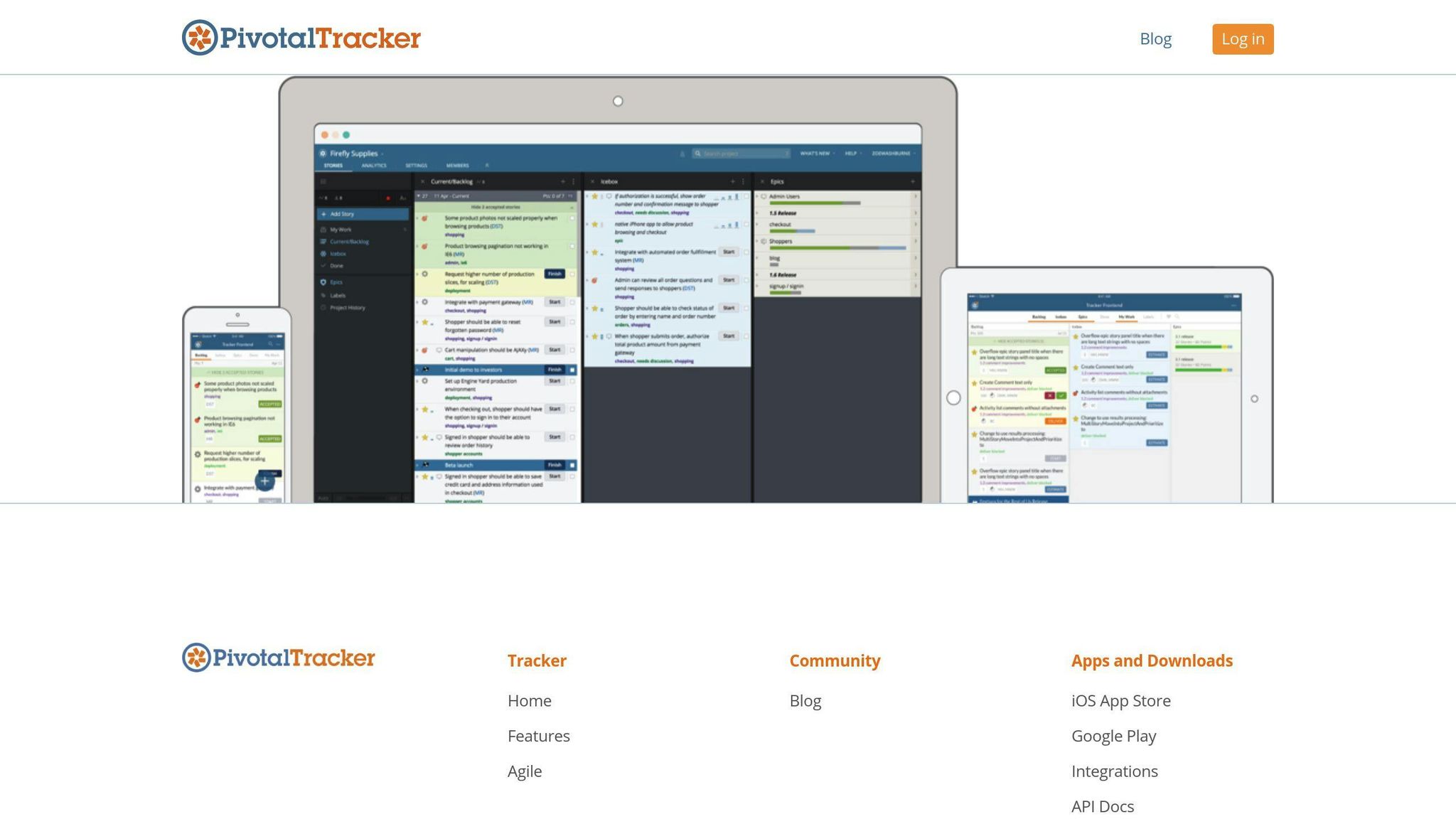
Pivotal Tracker is an Agile project management tool tailored for software development teams, offering a straightforward way to manage workflows.
Key Features:
| Feature | Description |
|---|---|
| Story Management | Organize and track user stories with real-time updates. |
| Sprint Planning | Tools for sprint setup and backlog organization. |
| Development Integration | Seamless connections with GitHub, Slack, and Jenkins. |
| Analytics Dashboard | Monitor team velocity and project progress metrics. |
Pivotal Tracker keeps things simple, focusing on the core needs of Agile development. Its interface is easy to navigate, and the built-in integrations with tools like GitHub, Slack, and Jenkins make collaboration smoother for technical teams.
Pricing and Accessibility: It offers a free plan with essential features, making it a great option for small teams or startups on tight budgets. The tool works best for software teams looking for simplicity rather than extensive customization.
When compared to Azure Boards, Pivotal Tracker provides a lighter, more straightforward solution - ideal for smaller, software-focused teams rather than general project management needs. If your team prefers a Kanban-style approach, you might want to explore Kanbanize for a different perspective.
7. Kanbanize

Kanbanize helps teams apply Agile principles by offering tools to visualize workflows, pinpoint bottlenecks, and improve processes. This project management platform simplifies even the most complex workflows with its user-friendly visual interface.
Key Features:
| Feature Category | Capabilities |
|---|---|
| Workflow & Collaboration | Customizable Kanban boards, workflow automation, shared workspaces, team communication |
| Analytics & Reporting | Detailed reporting, performance tracking, bottleneck detection |
| Integration Options | Connects easily with Jira, GitHub, Slack |
Pricing Details:
- Standard Plan: $9.95 per user/month
- Enterprise Plan: Custom pricing with additional advanced features
- Free trial available for testing
Kanbanize is known for delivering actionable insights through its analytics tools. Teams can use these insights to spot inefficiencies and enhance their workflows. Its automation features are especially useful for IT and software teams juggling multiple projects.
"Kanbanize supports continuous improvement by providing real-time data and insights that help teams identify areas for improvement. Its flexible and customizable nature also allows teams to iterate and refine their workflows as needed."
The platform's strong workflow management tools make it a top pick for teams looking to enhance process visualization and efficiency. For those shifting away from older project management methods, Kanbanize offers comprehensive support to ease the transition.
For teams in need of a more integrated development environment, GitLab combines Agile project management with DevOps tools for streamlined operations.
8. GitLab
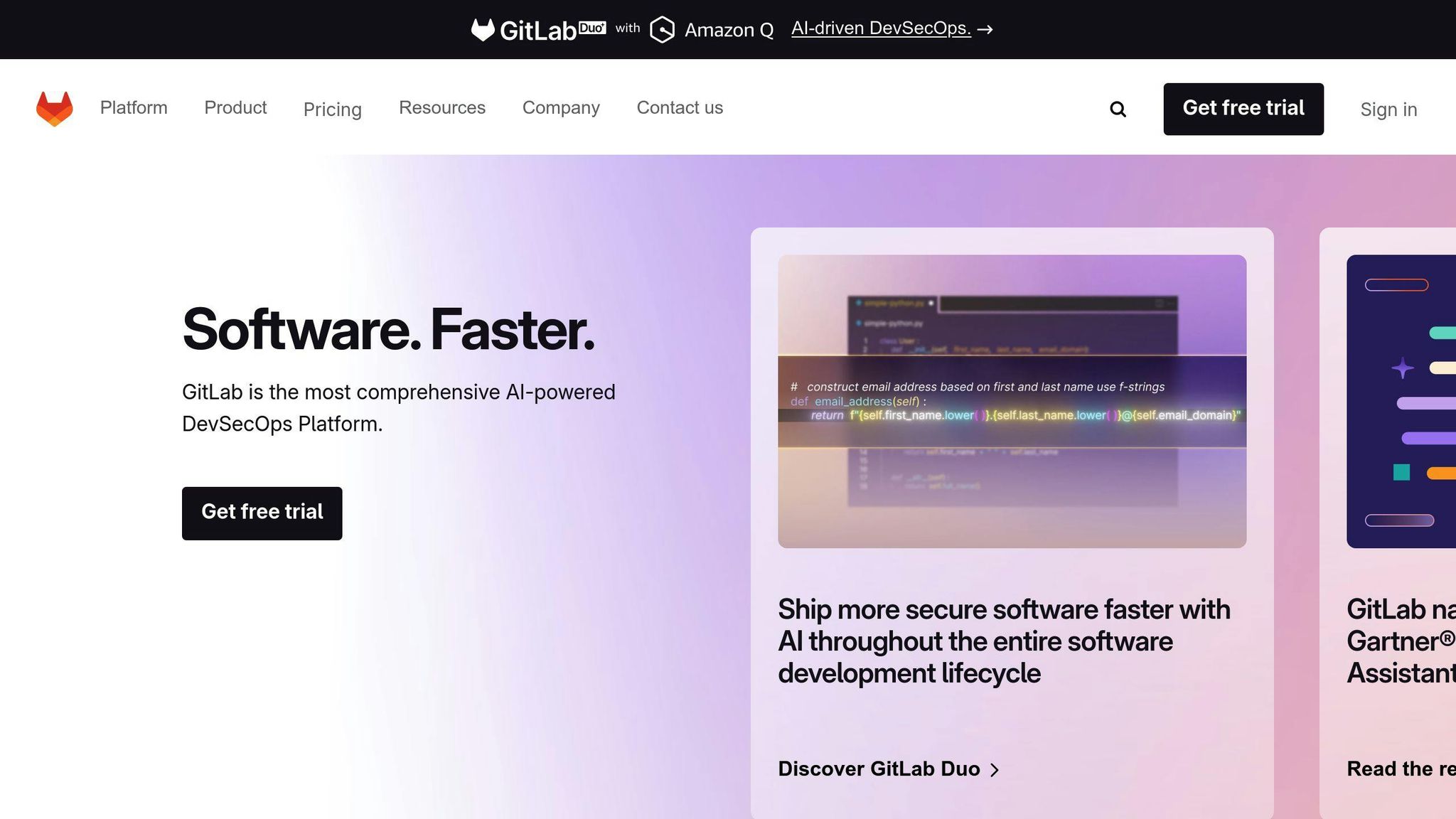
GitLab is a DevOps platform that combines Agile project management with development tools, cutting down the need for juggling multiple systems. It aligns with Agile principles by emphasizing teamwork, transparency, and iterative development.
Key Features and Pricing:
| Feature Category | Capabilities | Plan | Cost (Annual Billing) |
|---|---|---|---|
| Planning Tools | Epics, issue boards, roadmaps, burndown charts | Free | $0 (5 users per group) |
| Agile Support | Scrum/Kanban boards, sprint management, backlog tracking | Premium | $29/user/month |
| Integration | Built-in CI/CD, code review, wiki integration | Ultimate | Contact Sales |
| Security | SAST, DAST, compliance management | - | - |
GitLab's Planner role simplifies Agile planning while protecting sensitive project data, making it a great choice for product and project managers. Teams can use features like standardized issue templates and hierarchical boards to improve planning processes. Automated CI/CD pipelines enable quicker iterations and continuous improvements, boosting Agile workflows.
Though GitLab stands out for merging Agile workflows with DevOps, platforms like daily.dev offer a different take by focusing on developer collaboration and knowledge sharing.
9. daily.dev
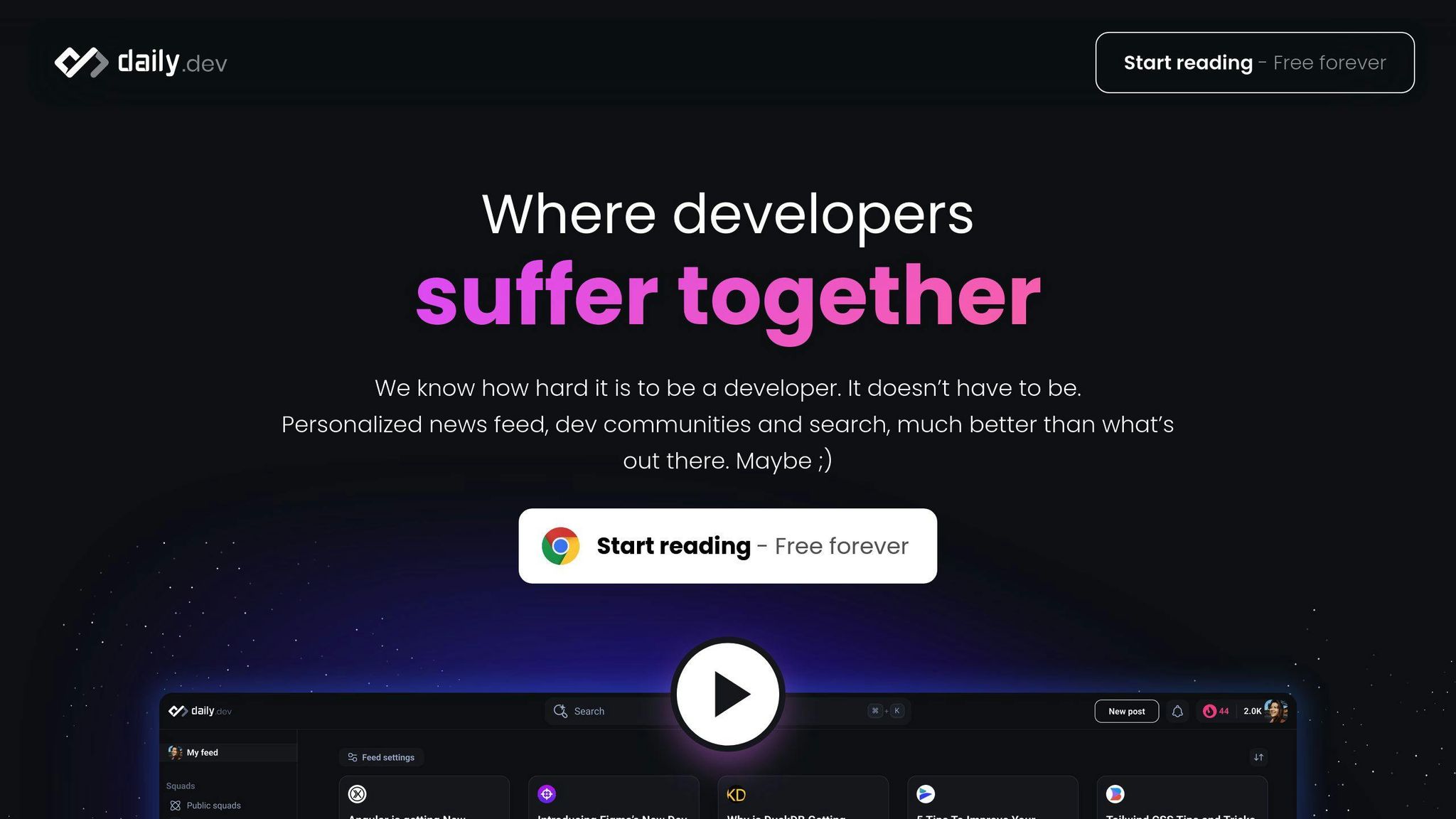
If your team needs a tool to boost collaboration and knowledge sharing while sticking to Agile workflows, daily.dev might be worth exploring. It’s designed to improve team communication and align seamlessly with Agile principles.
Key Features and Capabilities:
| Feature | Description | Agile Advantage |
|---|---|---|
| Squads (Beta) | Spaces for team collaboration | Supports self-organized teams and cross-functional communication |
| AI-Powered Answers | Solutions for technical queries | Speeds up problem-solving and clears blockers |
| DevCards | Profiles showcasing developer skills | Helps pinpoint team strengths and expertise |
| Verified Company Badges | Authentication for workplaces | Builds trust and transparency in team discussions |
The Squads feature creates dedicated spaces for teams to collaborate, encouraging self-organization and better communication across functions. With integrations for tools like Jira and Azure Boards, daily.dev strengthens Agile workflows by simplifying team interactions.
Beyond collaboration, daily.dev integrates smoothly with existing Agile tools, offering a richer development environment. Its AI-powered personalized news feed keeps teams informed about the latest industry trends and technical solutions, promoting continuous learning - an essential part of Agile.
For distributed Agile teams, daily.dev stands out by streamlining information sharing without disrupting workflows. Its browser extensions ensure team members stay connected and informed, even when working remotely.
Conclusion
Looking at the top Agile tools of 2025, it's evident that the best choice hinges on your team's specific needs and objectives. Larger software development teams often gravitate toward Jira for its extensive features and customization options, while smaller teams might prefer Trello for its straightforward and user-friendly design.
Key factors to consider when selecting an Agile tool include team size, integration requirements, scalability, and budget. Enterprise-level organizations may benefit from Microsoft Azure Boards, which integrates seamlessly within the Microsoft ecosystem. On the other hand, teams seeking flexibility could find Asana a better fit due to its adaptable framework.
Tools like GitLab and ClickUp are raising the bar in 2025 with advanced features such as DevOps integration, analytics, and customization. GitLab stands out for unifying development workflows and project management, making it a great option for teams looking for an all-in-one platform. Meanwhile, ClickUp supports a variety of Agile methodologies while offering strong collaboration features.
The key to success with Agile tools lies in aligning them with your team's workflows and culture. For example, Jira's scalability is ideal for growing teams, while Trello's simplicity allows for quick adoption by smaller groups.
As Agile practices continue to develop, staying informed and choosing tools that balance functionality with your team's needs will help maintain a competitive edge. Whether it's enterprise-focused platforms like Azure Boards or niche solutions like Pivotal Tracker, the goal is to find the right fit for your team's requirements.
FAQs
What is the most popular agile tool?
Jira continues to be a top choice for Agile teams in 2025, especially in software development. That said, the best tool often depends on team size and industry. For general task management, tools like Trello and Asana are widely used across various sectors. Each tool has its strengths - Jira handles complex project management, Trello is great for visual task organization, and Asana excels in team collaboration.
What is the best agile project management tool?
The "best" Agile tool depends on what your team needs. Here's a quick breakdown:
| Tool | Ideal For |
|---|---|
| Jira | Managing complex projects |
| Trello | Visual task organization |
| Pivotal Tracker | Small teams |
| Asana | Easy team collaboration |
| ClickUp | Customizable workflows |
| GitLab | Integrating Agile with DevOps |
Is there a better alternative to Jira?
Jira is powerful, but it might not be the perfect fit for every team. Some alternatives to consider include:
- Trello: Perfect for straightforward, visual task management.
- Asana: Known for its simple and intuitive team collaboration features.
- GitLab: Ideal for teams combining Agile practices with DevOps.
- ClickUp: Offers extensive customization for workflows.
Choosing the right alternative depends on your team's priorities. For example, if simplicity is key, Trello or Asana could work well. If your team uses Microsoft products, Azure Boards might be a better fit due to its seamless integration with the Microsoft ecosystem.
These FAQs are designed to help you quickly understand your options and pick the Agile tool that best fits your team's unique needs.

.png)








